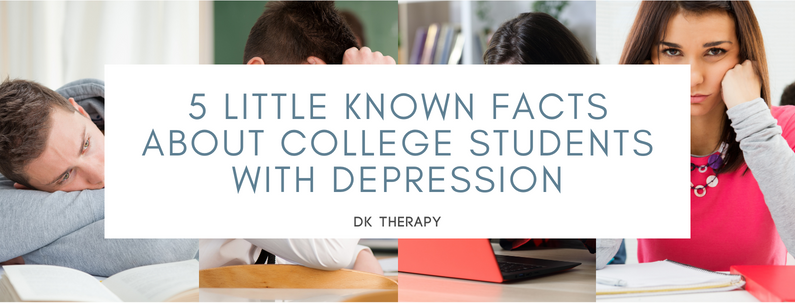
When many people think about the college experience, they picture parties, football games, late-night dinner runs with friends, and other fun social activities. As the saying goes, college is supposed to be the “time of our lives,” right? However, for college students with depression, this time can be difficult.
Roughly 41% of college students in the United States have been diagnosed with depression, and countless others experience symptoms of depression on a regular basis.
It is important for college students and their loved ones to recognize symptoms of depression so they can make sure students who are struggling receive the support they need.
Because college students are adults, sometimes their less obvious depressive symptoms go overlooked by others. This is often due to misconceptions that college only serves as a fun and positive experience for students and that adults don’t want to share their problems with others.

In reality, many college students not only experience depression but also actively want support for their negative emotions.
Here are five facts about college students and depression that everyone should know:
1. College students can still do well in school with depression
While skipping classes and neglecting coursework are common behaviors for college students struggling with their mental health, there are many students who are able to function well and succeed academically while experiencing depression.
The student with a 4.0 who is participating in each of their classes may be struggling just as much as the student whose grades are plummeting.
Just because your loved one is crushing it academically does not mean they are crushing every area of their lives. Make sure that you still check in with students who are succeeding academically. They may be facing a lot of pressure and anxiety that contribute to feelings of depression.
2. College students with depression want to share their feelings
In a study published in the Journal of Adolescent Health, 93% of college students reported wanting a “familiar adult, such as a professor or RA,” to approach them if they exhibited a sign of depression. This same study found that 60% of college students who contend with depressive symptoms would want a friend or relative to talk to them if they showed symptoms.
Some people feel like college students wouldn’t want to be vulnerable about their negative experiences, or they believe that they only need to check in with younger adolescents about their feelings. However, college students who live with depression appreciate it when others reach out to them to talk.
3. Depression may disrupt sleep for college students
Everyone is familiar with the stereotypical college student who downs several coffees or energy drinks to pull an all-nighter to finish a paper or who goes out partying until the early hours of the morning.
However, not every sleep-deprived college student is just cramming for exams or going out partying.
Sometimes, depressed college students experience insomnia and other unhealthy sleeping habits, but these symptoms are overlooked because people expect college students to stay up late.
If you or someone you love has been struggling to get a good night’s rest, check in with them to see if there is something more at play than an active nightlife or last-minute study habits.
4. Struggling college students may feel isolated
Many people don’t think that college students experience isolation because there is always so much to do on campus and so many people to do these activities with every day.
How can a college student feel lonely or isolated when they spend all day in classes, dining halls, and dorm rooms with other people?
Depression can make it difficult for college students to form meaningful relationships with other people, and it can increase their desire to withdraw from their roommates, classmates, and other friends.
Remember, just because someone always seems to be a part of a social group does not mean that they don’t feel alone.
5. It can be hard for college students to cope with negative thoughts
College students who experience depression may turn to negative habits to cope with their feelings.
Because many people associate college life with drinking, taking drugs, and partying, they can ignore signs that someone is using these habits as a way of dealing with their depression.
When a college student drinks heavily every day, it might be their way of masking symptoms and not just embracing party culture.
If you know and love a college student, these five little-known facts can help you make sure they receive the help they need if they are experiencing depression.




